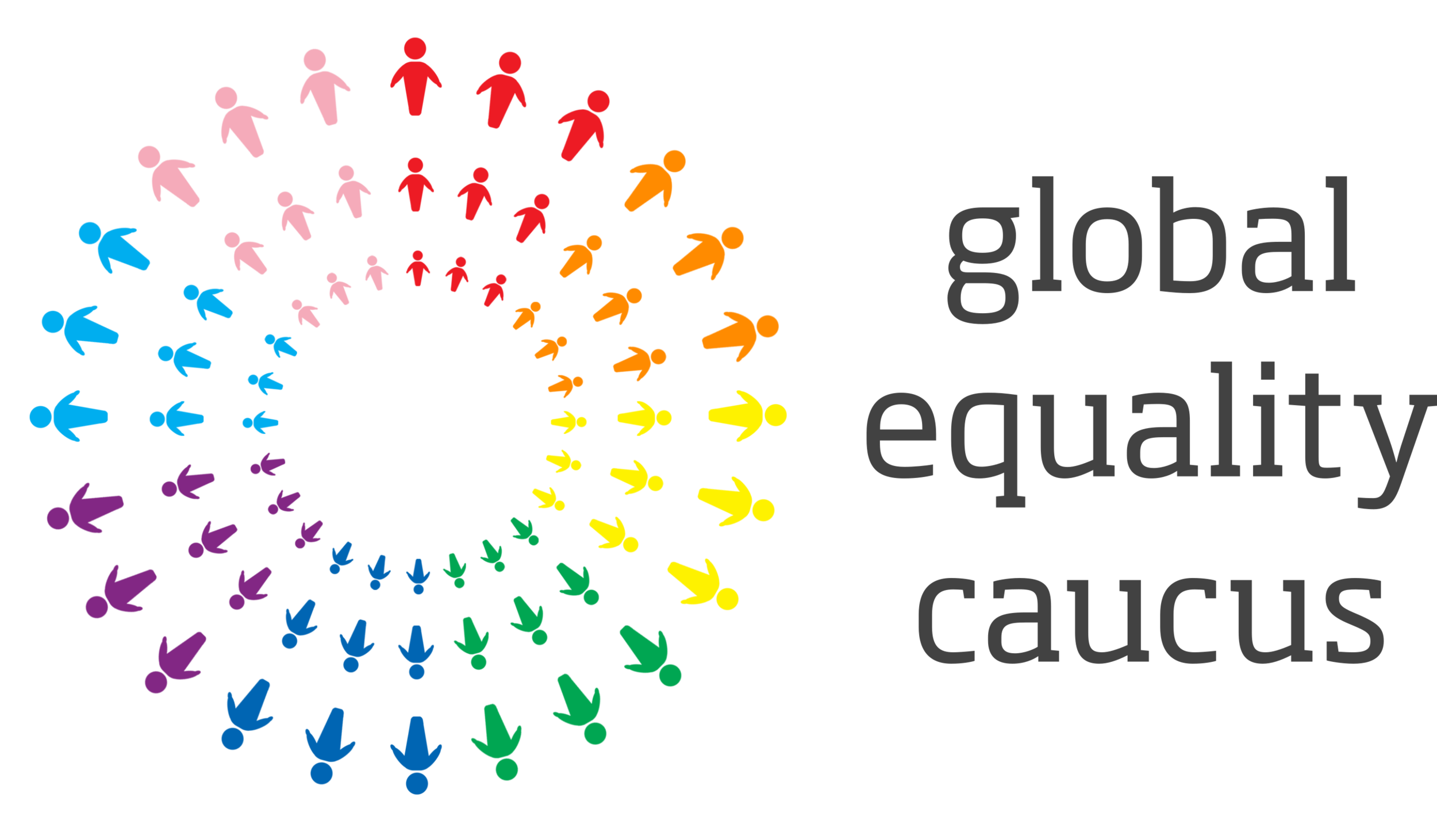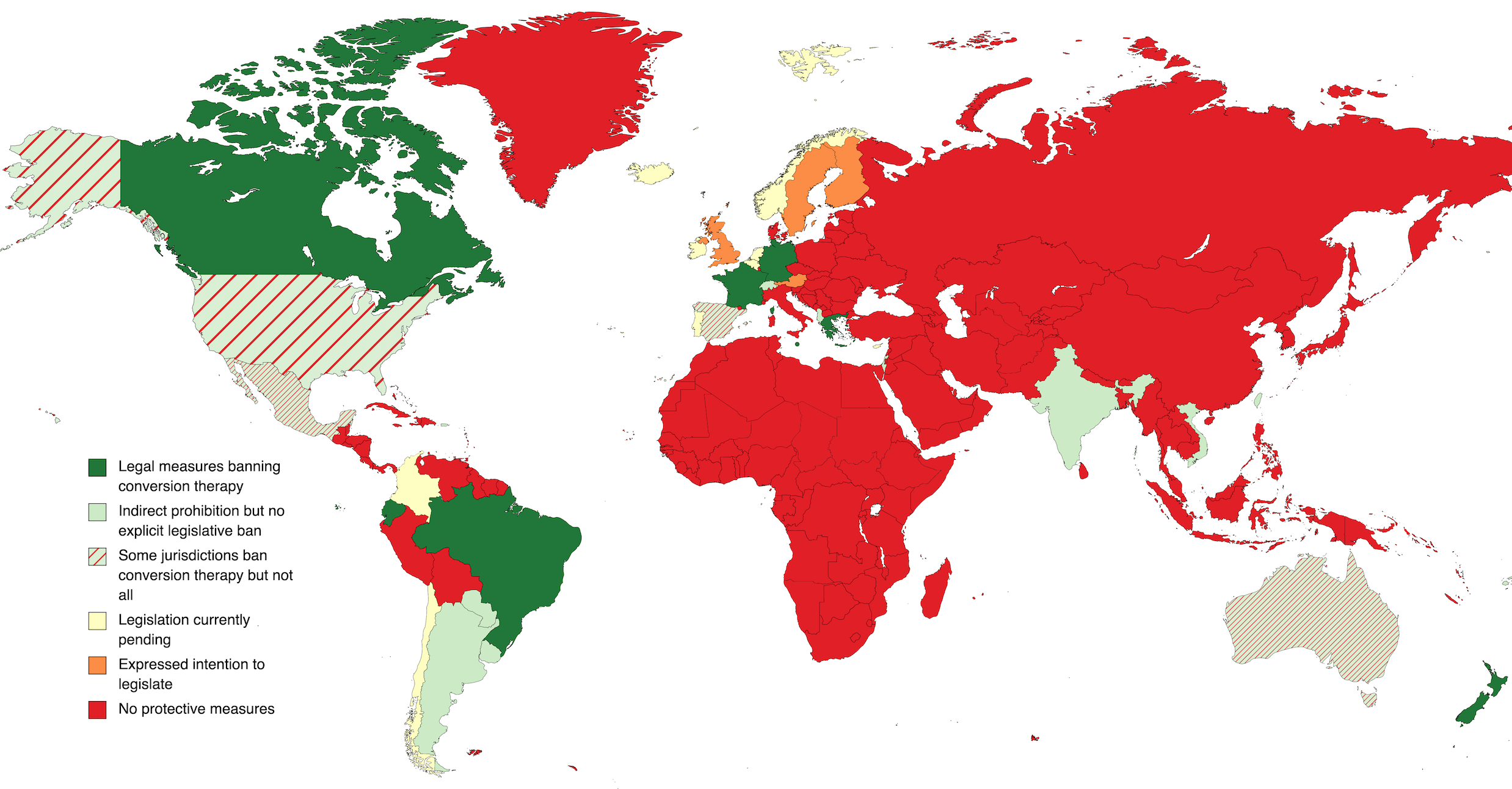Which countries banned 'conversion therapy' in 2022?
So-called ‘conversion therapies’ attempt to suppress, divert or change somebody’s sexual orientation or gender identity, based on the false premise that LGBT+ identities need to be ‘cured’. They can be psychologically and physically damaging, with the abuse often targeted at already-vulnerable people such as minors, and can happen in both clinical and religious settings.
This year, efforts to ban these abhorrent practices have accelerated globally. At the end of 2021 only four countries had explicit legal measures banning conversion practices nationwide, but in 2022 we have seen numerous jurisdictions advance legislation and executive measures across different levels of government.
Throughout 2022 the Global Equality Caucus has been working with legislators and civil society partners to help build consensus on ‘conversion therapy’ bans as part of our Ban Conversion Therapy Now! campaign. While dedicated legislation that defines and criminalises conversion therapies remains the most effective way to end these practices, lawmakers have found several ways to introduce bans.
We have been tracking progress on these bans for the past year. Here’s where ‘conversion therapy’ has been banned in 2022 (and where we are yet to see progress):
GEC’s map tracker in December 2021.
GEC’s map tracker in December 2022.
EXPLICIT LEGAL BANS
In January 2022, Canada and France introduced comprehensive bans on ‘conversion therapy’, with both countries having passed legislation the previous month. The bans protect both minors and adults regardless of perceived ‘consent’, cover both sexual orientation and gender identity, and apply in both clinical and religious settings. Anybody found to be offering or practicing conversion therapies is liable for a fine or imprisonment.
In February 2022, New Zealand passed the Conversion Practices Prohibition Act, with the same breadth of protection as Canada and France.
And in May 2022, following an amendment to the Health for All Act, legislators in Greece passed measures explicitly banning ‘conversion therapy’ for people under the age of 18 and ‘non-consenting’ adults.
At a sub-national level, legislation passed in the Australian state of Victoria in 2021 finally came into effect in February 2022. The law, first proposed in 2020, has been hailed as a gold-standard template for ‘conversion therapy’ legislation and certainly helped serve as a blueprint for the ban in New Zealand.
Several Mexican states also banned conversion practices this year, following the first-in-the-nation example set by Mexico City in 2020. Legislators in Jalisco, Baja California, Puebla, Hidalgo and Sonora all passed measures, with the Hidalgo law a direct result of workshops held at our Mexico City event in April 2022.
And in August 2022, an executive order from the Governor of Pennsylvania directed state agencies to protect LGBT+ minors from conversion practices and ensure no state funds are given to organisations offering them.
Indirect bans
In February, the Ministry of Health in Israel issued a departmental circular announcing that medical professionals are prohibited from offering, advertising or conducting conversion therapies, with those found to be in breach of these terms liable for punitive measures. At present the directive has not been codified by legislators, although a bill proposing a ban was given initial approval by the Knesset in 2020.
The same month, the National Medical Commission of India made a submission to the Madras High Court clarifying that any licensed medical professional in the country found to be offering conversion therapies is liable to be prosecuted for professional misconduct. As in Israel there is no national legislation outlining an explicit ban, but the submission reaffirmed a 2021 court order banning any attempts to “cure or change” the sexual orientation or gender identity of LGBT+ people.
In August, the Ministry of Health in Vietnam published guidance to clarify that homosexuality and trans identities are not considered diseases to be cured, and that medical practitioners should not engage in coercive treatments that attempt to change somebody’s sexual orientation or gender identity.
And in November, Paraguay joined Argentina and Uruguay to become the third South American country to include an amendment to its mental health law, which prohibits a mental health diagnosis on the basis of “sexual choice or identity”. While this in practice means medical professionals cannot offer ‘conversion therapy’, the law does not explicitly ban it in all settings - GEC is working with legislators in the region to bring forward bills that explicitly clarify that conversion practices are banned.
Members of GEC in Latin America meet with UN Independent Expert on SOGI Victor Madrigal-Borloz to discuss efforts to ban ‘conversion therapy’ across the region.
Where have bills been introduced?
Several countries proposed legislation throughout the year but due to legislative processes, timetables and elections they are yet to pass.
GEC member Hanna Katrin Fridriksson of Iceland introduced a backbench bill to the Althing in January but it is yet to progress. In the Netherlands, GEC Steering Committee member Senator Boris Dittrich has helped to champion a bill introduced to the Dutch Parliament in February, which has been referred to committee. A proposal in Cyprus has also reached committee stage and is likely to pass in 2023.
In South America, GEC member Mauricio Toro introduced a bill to the Congress of Colombia in May but it failed to pass before the new Congress began its term in July. A bill has since been reintroduced by a cross-party group of legislators.
In Norway, GEC member and Norwegian equality minister Anette Trettebergstuen introduced a bill proposing a comprehensive ban on ‘conversion therapy’, going further than plans first announced by the previous government in 2021. The legislation is currently undergoing parliamentary scrutiny. In Belgium, a similar ban has been approved by the Cabinet and is awaiting final approval from the Chamber of Representatives.
And in Mexico, after nearly four years of stalemate, the Senate passed a federal bill following consultation with campaign group Yaaj Mexico and dialogues at GEC’s summit in Mexico City. The ban will come into effect once it is approved by the Chamber of Deputies, likely in 2023.
Demonstrators in the UK protest the government’s decision to exclude trans people from a ‘conversion therapy’ ban.
WHERE CAN WE EXPECT LEGISLATION IN 2023?
Several other countries have expressed an intention to legislate but their governments are yet to introduce a parliamentary bill.
The United Kingdom government published its proposals for a ‘conversion therapy’ ban at the end of 2021 but reports emerged in March 2022 that the ban was being dropped. Following a partial U-turn, the government announced that they would proceed with a legislative ban after all but the proposals would exclude gender identity, meaning trans people would not be protected by a ban. A trans-exclusionary ‘conversion therapy’ ban was subsequently announced in May as part of the government’s legislative programme, but following a series of government crises, as well as further consultations regarding gender identity, no legislation has been forthcoming. A bill may be introduced before the end of the current parliamentary session in 2023.
In the Republic of Ireland, the government has announced that it is conducting research into the prevalence of conversion practices in the country and intends to introduce legislation that will ban ‘conversion therapy’ for both sexual orientation and gender identity.
Several political parties in Sweden have expressed support for an explicit legislative ban, and the current government in Finland has made a commitment to bring forward measures.
And in Australia, state bans are due to be proposed in New South Wales, Tasmania and Western Australia.
For further details on global progress, you can view our map tracker here via our Ban Conversion Therapy Now! Info Hub.




